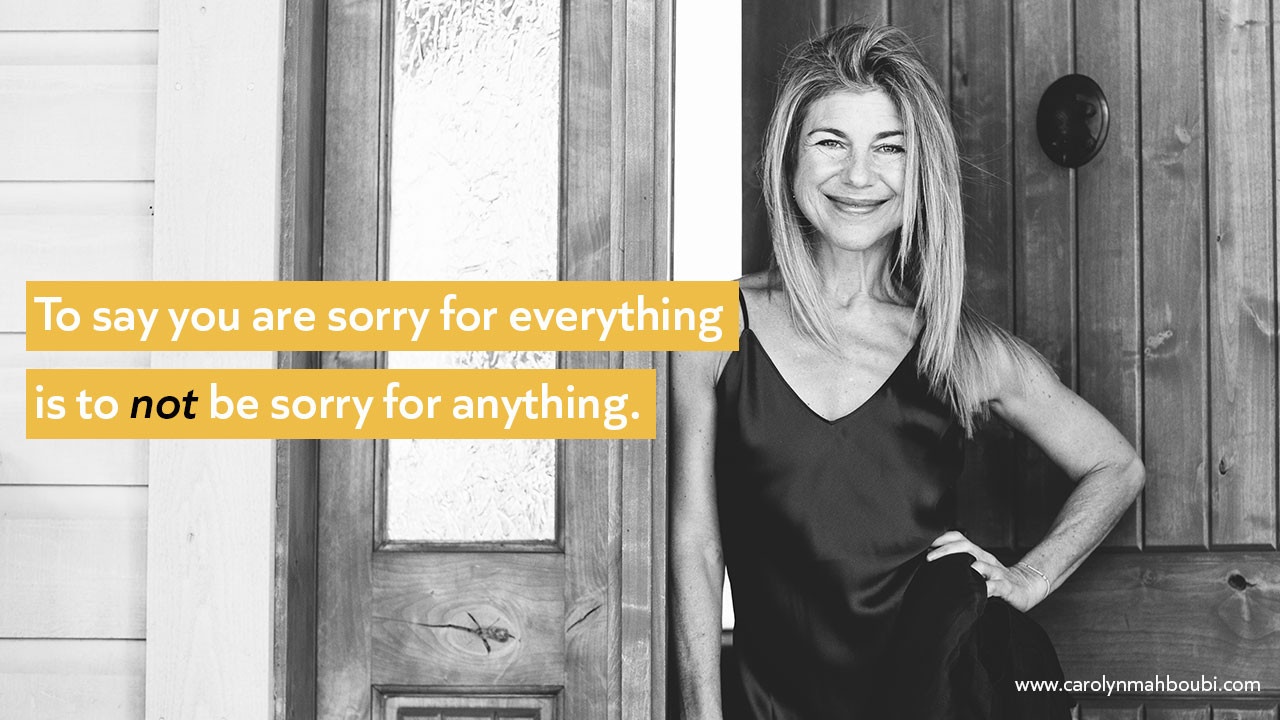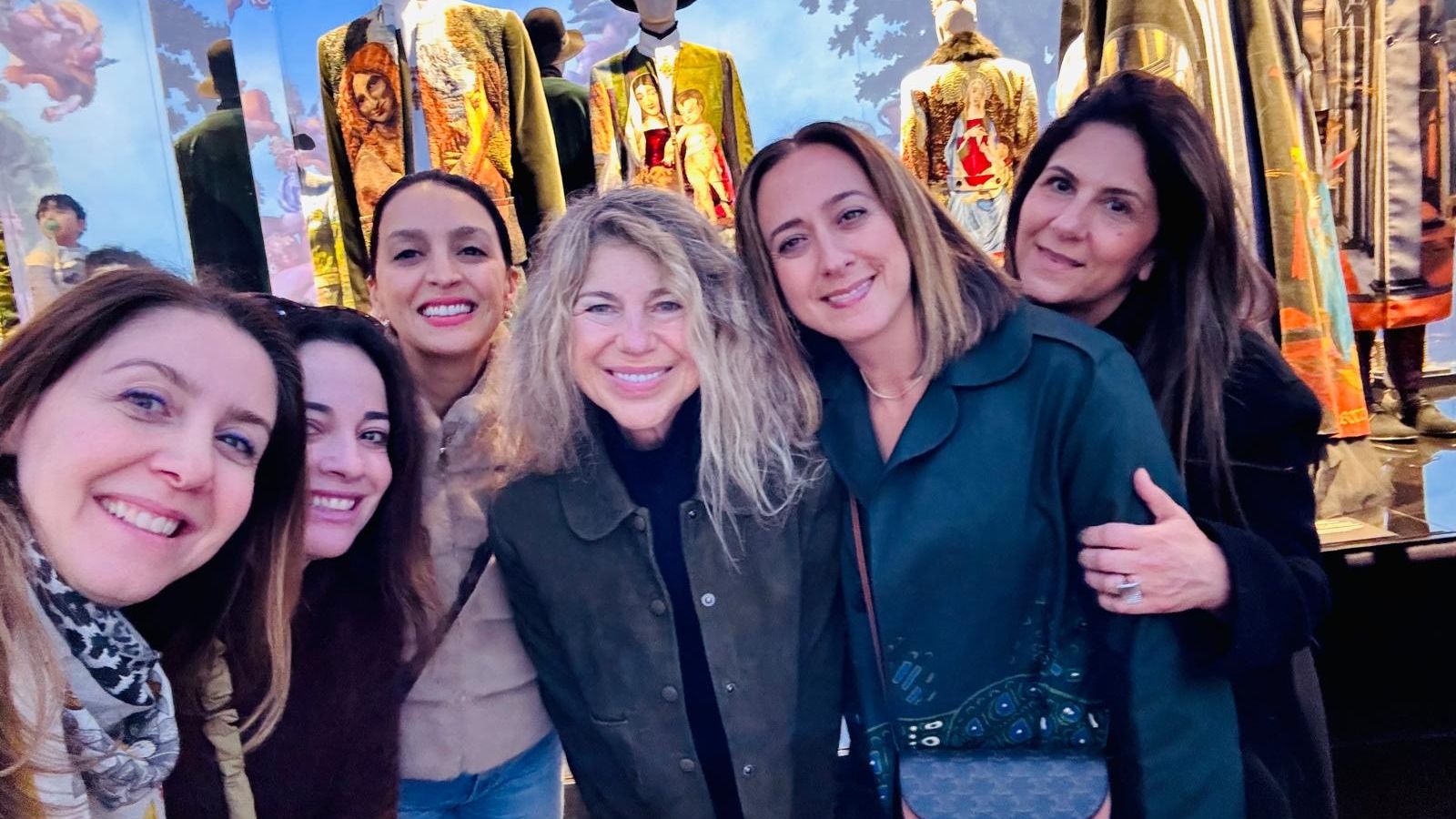Sorry (Not Sorry)!

What are you apologizing for these days?
Let me guess.
Almost everything?
Most of us go through our days and ultimately our lives habitually apologizing. If you don’t think this applies to you, try the following experiment for a day or a week.
Become aware and take note of how often you apologize transactionally and for social reasons.
Social reasons reflect long held and often unconscious beliefs that have gone unquestioned our whole lives. Most social apologizing stems from our desire to be people pleasers, and women are especially prone to falling into this trap.
We apologize in advance for asking the waiter for a drink, the teacher to explain a concept more clearly, and to our child or husband for not having had enough time in the day to do an errand for them.
Clue: If you’re starting a sentence with “I’m sorry,” you’re apologizing.
Record how often you over-apologize. This looks like repeatedly beating yourself up and apologizing profusely when a simple “I’m sorry” can suffice.
Clue: If you’ve actually made an error and have sincerely apologized for it, but you keep repeating the apology in different words externally and shaming yourself internally, you’re over-apologizing.
My client, Kathy, took me up on the invitation to engage in this experiment and here is a partial list of all the things she apologized for in a one week period. The complete list is too long to share but you’ll get the idea from this condensed version.
She wrote, “I apologized for:
1. How I looked on Zoom.
2. Needing to pass someone in the grocery aisle.
3. Not responding to an email immediately.
4. Not being able to be at my kid’s basketball game because I had to be at work.
5. Having my phone off (my mental care hour) when my mother called.
6. Making a clear and thoughtful decision to not invite a friend to my event and then framing it as a misunderstanding.
7. Being tired due to not enough sleep.
8. Crying.
9. Laughing.
10. Both talking “too much” and not talking “enough”.”
When we robotically apologize for everything, we create the possibility of our real and heartfelt apologies sounding hollow and falling on deaf ears.
The first time my client, Michelle, was late to our session, she apologized and I accepted. The second and third time this happened, I understood that tardiness and hollow apologies were patterns that were undermining Michelle’s ability to lead (herself, her family, and her business) effectively. In a Coaching relationship, this awareness is an opportunity for growth. In most other relationships, it only leads to resentment.
If a pattern shows up in one area of your life, it’s almost certainly showing up in every other arena as well. A person who is habitually late is not sorry for it, or else they would have changed the habit. This is a person who is fully aware of her/his tendency to be late and has consciously or unconsciously chosen to make whatever tradeoff comes with that way of living.
People in our lives know and hopefully accept our habits. But robotically apologizing to others for habits we are choosing to keep, only diminishes their respect for us. And worse, it has us stepping out of our power to create new habits that serve and ultimately remove us from the apology loop.
Perhaps the most insidious effect of the apology habit is that it chips away at our ability to feel grounded and whole; the deep and profound feeling of being OK just the way we are in this moment, however human and imperfect we may be.
When we live life from the OK mindset, we become so much more light-hearted and spacious. We realize we are not broken, evil, and generally unworthy. We’re just human and kind of hilarious most of the time in our relentless effort to achieve perfection. Finally, the most significant positive impact of reducing our apology footprint is that we are taken seriously and feel good from the inside out when we offer a real apology.
A real apology is what is required when we inadvertently hurt or cause difficulty, discomfort, and pain in someone else’s life.
A real apology is what is required when we make a promise, an agreement, or contract and then break it.
A real apology is the only appropriate response when we don’t show up for our word.
And it’s just the first part of what is often an uncomfortable but much needed and potentially transformative conversation.
I’m sorry, and…..”
It’s only after the word “and” we can create a space to go deeper into what is at the root of our inability to keep our word or uphold an agreement. This is the sacred space that we destroy when we throw around meaningless apologies like confetti at a wedding.
A real apology is the most powerful and impactful relationship life skill in our tool kit. It’s to be used sparingly if we want it to be effective in circumstances where only this tool will get the job done. When we deliberately stop apologizing for doing nothing wrong or being who we are and everything in between, we are sharpening our saw and preserving its power.

Nothing I can write brings the point home as poignantly as my client, Gabriella, did in her recent email to me which I share with her full permission.
“Yesterday during my morning practice I took a moment to meditate upon the question "who do you want to be today?"
And the answer that emerged was "unapologetic."
And so I lived the most unapologetic day of my life yesterday… and it was incredible.
I experienced myself in a new and profound way. I experienced my interactions with people in a completely new way.
I felt so energized. Probably because I was no longer wasting energy on being small. I felt like I embodied my body and my being.
I felt the shift so deeply. People interacted with me differently. They respected me more. They connected with me more, and I with them. I was able to show up in my relationships and at my job as such a wonderful version of myself.
And I realized that it not only did me good, it also did good to those around me.
I owned my feelings. Respected them. And myself. I trusted myself. I allowed myself to show up as myself in my interactions, and didn't get caught up in the insecurities of "what will they think, etc." This made me realize that a part of me is afraid to show itself sometimes. The part of me that is quirky, enthusiastic, loving, capable, the part of me that likes taking charge and being awesome. And I let myself be that person yesterday.
I had no idea how much I have been apologizing every second of every day just for being me.
Yesterday was a normal day. But it was one of the best days of my life.”







